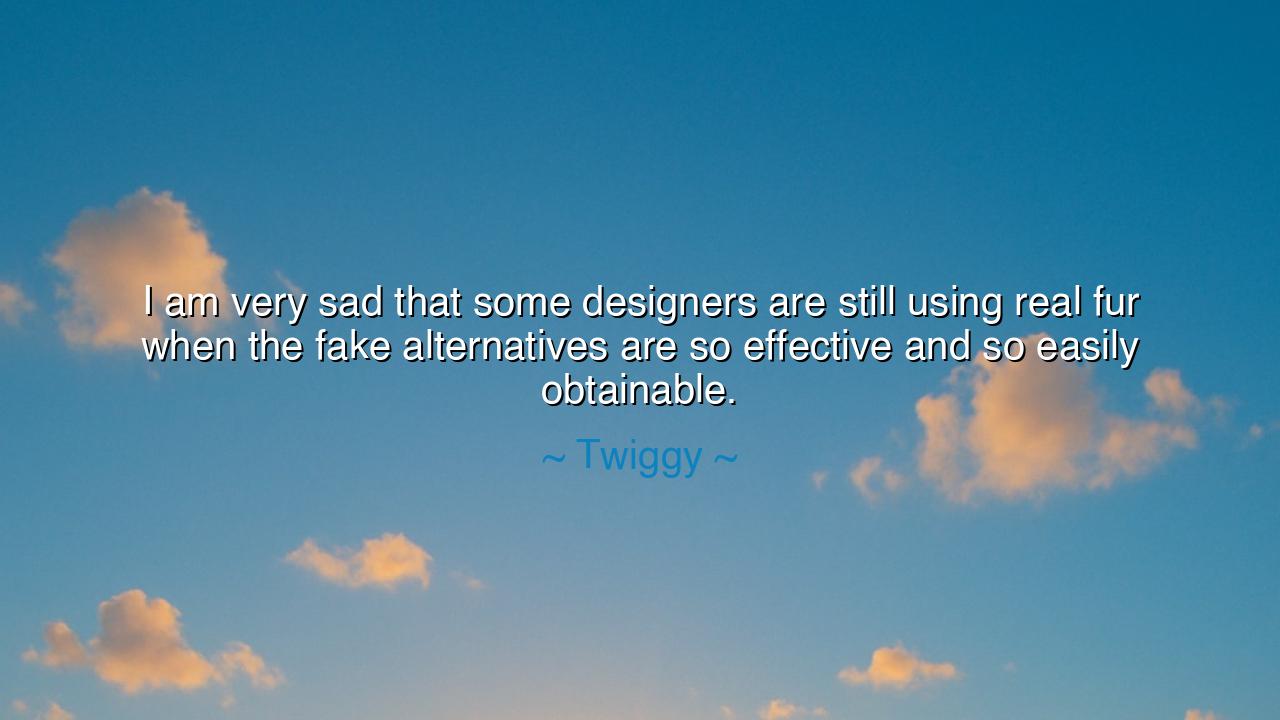
I am very sad that some designers are still using real fur when
I am very sad that some designers are still using real fur when the fake alternatives are so effective and so easily obtainable.






Hearken, children of reflection, to the words of Twiggy, who laments: "I am very sad that some designers are still using real fur when the fake alternatives are so effective and so easily obtainable." In these words lies a meditation on human compassion, moral responsibility, and the ethical evolution of artistry. Since the days of the ancients, philosophers and poets have wrestled with the tension between beauty, luxury, and the sanctity of life, teaching that true elegance arises not merely from appearance, but from the harmony of skill, conscience, and empathy.
The ancients understood that the pursuit of beauty carries ethical weight. Plato and Aristotle both argued that virtue and the cultivation of taste are inseparable; to admire or create beauty without consideration of its consequences is to act incompletely, even unjustly. Twiggy’s sadness reflects this principle: the use of real fur—beauty obtained at the expense of sentient life—stands in opposition to both ethical and aesthetic wisdom. Modern alternatives, she notes, offer the same splendor without causing harm, demonstrating that moral artistry is both possible and necessary.
Consider the historical example of the Venetian glassmakers of Murano, whose craft was prized across Europe. Though their creations were magnificent, they faced scrutiny when their techniques endangered apprentices and resources. Over time, artisans adapted, finding methods that preserved both their art and the safety of those involved. Twiggy’s observation is analogous: true designers must adapt, seeking materials that honor both creativity and life, embracing innovation over destructive tradition.
The quote also illuminates the role of choice in ethical practice. The availability of fake alternatives, both effective and accessible, underscores that continued reliance on real fur is not a necessity but a preference. This is a moral crossroads, where opportunity and ease intersect with conscience. History teaches that when humanity has the capacity to act with compassion, failure to do so reflects not limitation, but the persistence of outdated habits or the prioritization of prestige over principle.
Moreover, Twiggy’s words highlight the power of influence. Designers, as creators of culture and taste, hold sway over societal norms and expectations. The continued use of real fur perpetuates a cycle of harm and tacit acceptance, whereas embracing ethical alternatives can shift the standard of beauty toward compassion and innovation. Ancient sages would recognize this responsibility: those gifted with skill and visibility must align their craft with virtue, lest beauty become a tool of cruelty rather than inspiration.
From this reflection emerges a timeless lesson: moral responsibility and creativity are inseparable. True artistry honors life and promotes innovation without exploitation. Twiggy teaches that we must evaluate not only the elegance of the final work, but the means by which it is achieved. Ethical choices in design, fashion, or any craft are a testament to character and wisdom, shaping both culture and conscience.
Practical actions follow naturally. Choose materials and practices that minimize harm and reflect consideration for life. Support creators who embrace ethical innovation, and encourage adaptation of traditional methods in light of modern alternatives. Reflect upon the consequences of aesthetic choices, understanding that the pursuit of beauty carries both responsibility and power. Advocate for change where destructive practices persist, fostering a culture of compassion alongside creativity.
Remember, children of the ages, that the pursuit of beauty is not merely the adornment of surfaces, but the cultivation of the heart and mind. Twiggy’s words illuminate the eternal truth that elegance devoid of conscience is incomplete. By embracing ethical alternatives, respecting life, and acting with informed compassion, we ensure that our artistry reflects not only skill, but virtue, transforming culture, and shaping a legacy worthy of admiration across generations.






AAdministratorAdministrator
Welcome, honored guests. Please leave a comment, we will respond soon